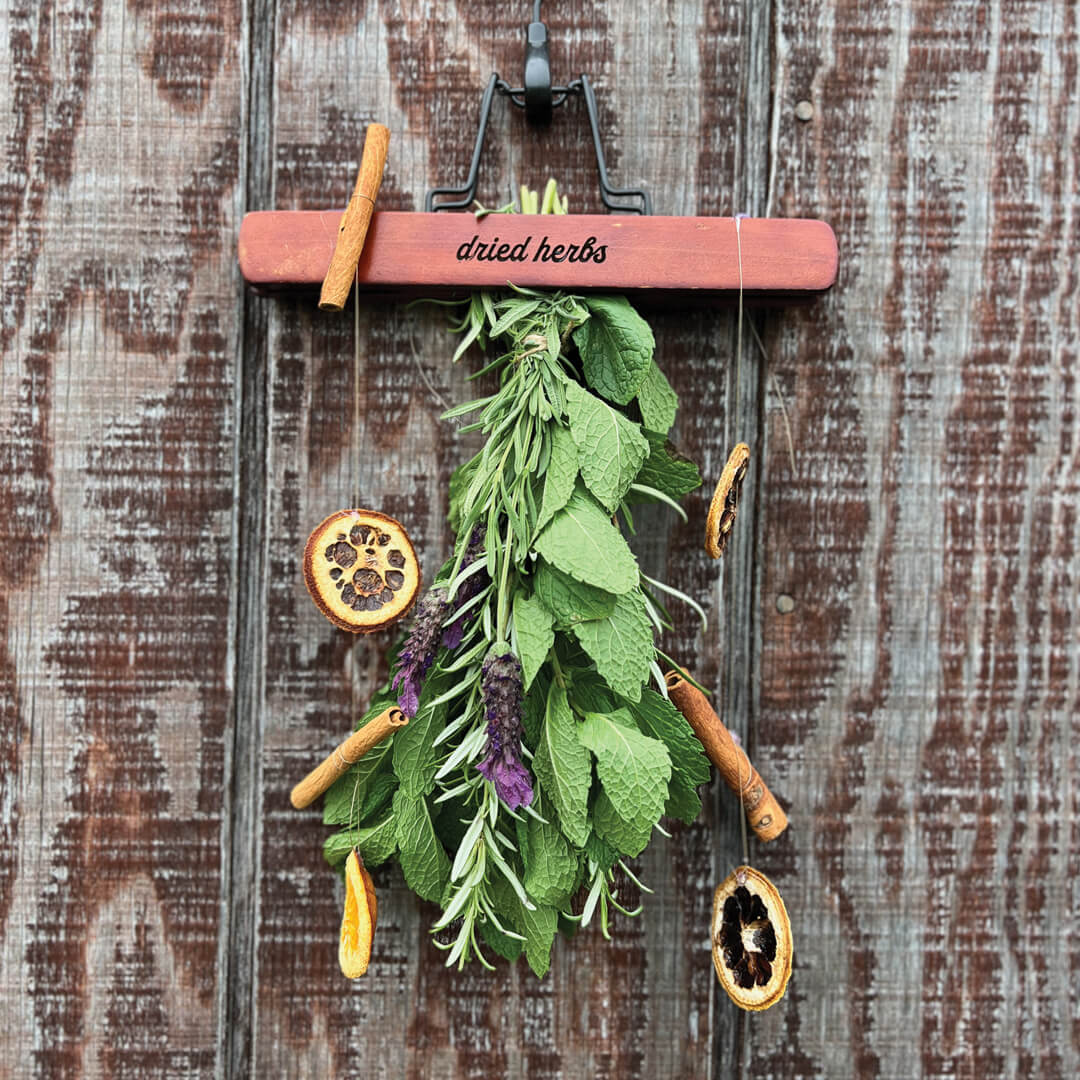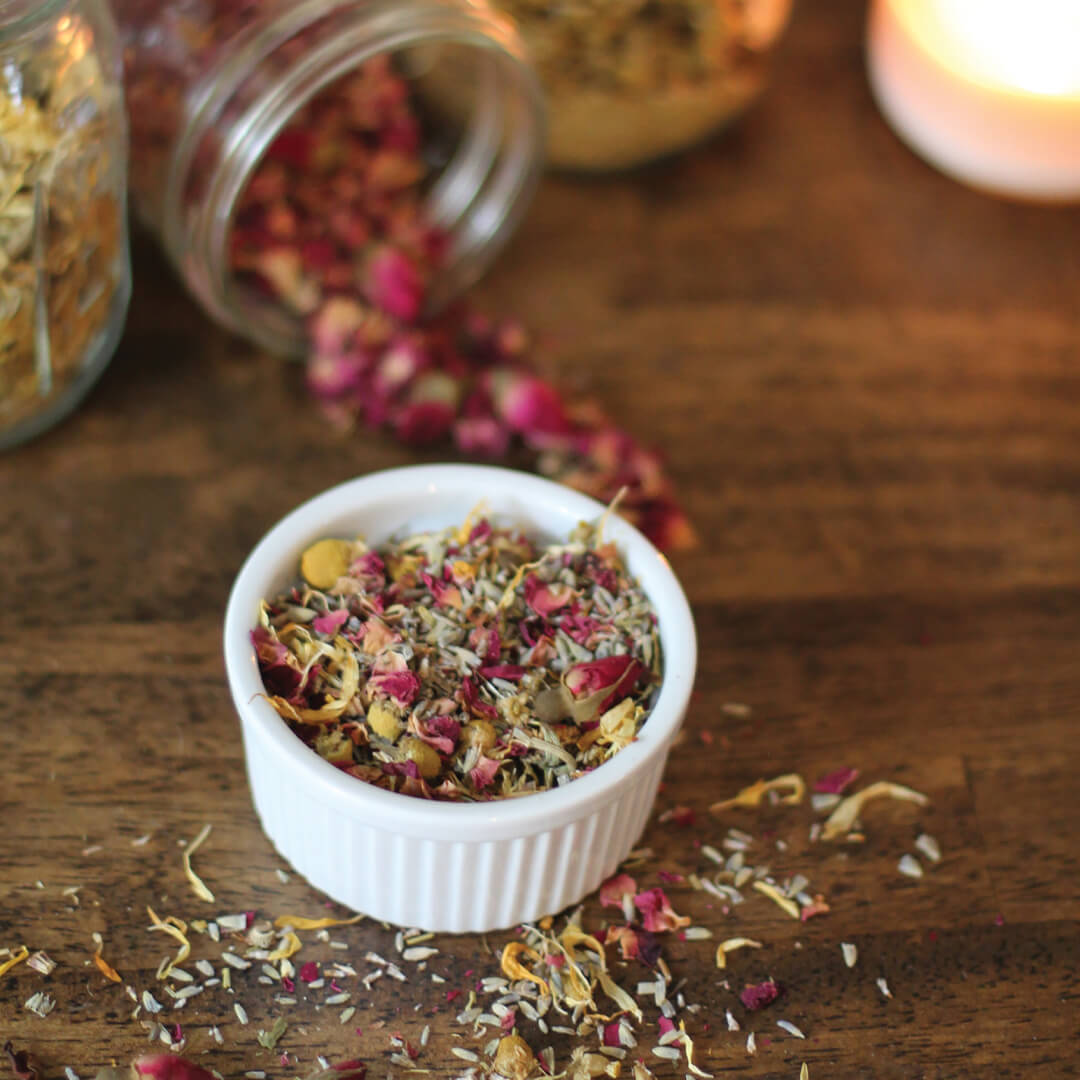10 Essential Herbs to Grow for Homemade Bath and Body
0 Comments
Photo Credit: Sibyl Smith
As the sun warms the earth and whispers of spring fill the air, one of the most rewarding activities is planting an herb garden. Not only do herbs infuse your dishes with a burst of flavor, but some herbs also offer incredible options for body care and medicinal purposes, among other uses. Read on to learn more about herb gardening and explore ten essential herbs to grow for homemade bath and body.
What Are Herbs?
Herbs are plants valued for their medicinal, culinary, aromatic, or ornamental qualities. Unlike fruits or vegetables – typically consumed as part of a meal – herbs are often used in smaller quantities to add flavor, fragrance, or therapeutic benefits to dishes, beverages, bath and body products, and more.
Characteristics of Herbs
- • Aromatic: Many herbs have aromatic properties, releasing fragrant oils when crushed or bruised. These oils contain compounds that contribute to the herb’s flavor and aroma.
- • Flavorful: Herbs come in diverse flavors, ranging from savory and earthy to sweet and spicy. Each herb adds a unique taste profile to dishes, making them essential in culinary traditions worldwide.
- • Medicinal: Some herbs have medicinal properties and are part of herbal medicine for their therapeutic benefits. For example, chamomile is known for its calming properties, while peppermint serves to soothe digestive issues.
- • Versatile: Herbs can be used in various forms, including fresh, dried, powdered, or as essential oils. You can incorporate them into recipes, teas, tinctures, bath and body products, and natural remedies.
- • Easy to Grow: Many herbs are easy to grow at home, whether in indoor pots, your garden, or a window box. They can thrive in different soil conditions and climates, requiring minimal maintenance.
Learn more about herbs in Willow and Sage Spring 2024.
Herb gardening for Homemade Bath and Body
Benefits of Herb gardening
- • Freshness: By growing herbs, you can get fresh, high-quality ingredients directly from home for your homemade bath and body products.
- • Customization: With your herb garden, you can customize the types and varieties of herbs you grow based on your skincare needs and preferences.
- • Cost-Effective: Herbs are generally easy to grow and maintain, saving you money compared to purchasing them regularly.
- • Therapeutic Experience: Gardening can be a therapeutic and rewarding experience, providing stress relief and a connection to nature.
Herb gardening Tips
- • Choose the Right Location: Most herbs prefer full sun and thrive in well-draining soil. Plant your herbs in a sunny spot in your garden or, for flexibility, use containers.
- • Begin with Easy-to-Grow Herbs: If you’re new to gardening, start with herbs like basil, rosemary, and mint, which are relatively low-maintenance and beginner-friendly.
- • Provide Adequate Water and Nutrition: Herbs need regular watering, especially during hot weather. Use organic fertilizers or compost to nourish your plants.
- • Prune and Harvest Regularly: Pruning prevents herbs from becoming leggy while encouraging bushy growth. Harvest herbs regularly to maintain freshness and promote new growth.
- • Protect from Pests: Use neem oil, insecticidal soap, companion planting, or other natural pest control methods to protect your herbs from diseases and pests.
Find a wealth of gardening inspiration in In Her Garden Magazine.
Herb garden Design Ideas for Small Spaces
- • Container Gardens: Perfect for small spaces or balconies, container gardens allow you to grow herbs in pots or planters.
- • Vertical Gardens: Vertical herb gardens are ideal for growing a wide range of herbs in a limited area as these maximize vertical space. Use hanging baskets, wall-mounted planters, or trellises.
- • Herb Spirals: Herb spirals are a creative and space-efficient way to grow multiple herbs in a spiral-shaped raised bed, utilizing different microclimates for various herb varieties.
10 Herbs to grow for Homemade Bath and Body
1. Lavender
Lavender is a beloved herb known for its calming and relaxing properties. It’s perfect for soothing baths, massage oils, and aromatherapy blends. Because of its ability to induce relaxation and alleviate stress, lavender essential oil is a staple in many skincare products. Besides its aromatic qualities, lavender has antimicrobial properties, which are beneficial for maintaining healthy skin.
Discover bath and body recipes with lavender in our Willow and Sage magazine.
2. Peppermint
Peppermint is a refreshing herb that invigorates the senses with a cooling sensation. It’s excellent for body scrubs, foot soaks, and shower steamers. To avoid peppermint from spreading uncontrollably in your garden, you should grow it in a container.
3. Chamomile
A calming herb for both mind and body, chamomile is a good choice for sensitive skin types. Commonly used in bath teas, facial steams, and baby products, chamomile is renowned for its gentle and soothing properties. Chamomile tea can be added to bathwater for a calming soak, while chamomile-infused oil is perfect for moisturizing and soothing dry, irritated skin.
4. Rosemary
Rosemary is a fragrant herb with antioxidant properties that benefit both the skin and hair. It’s often part of hair care products such as shampoos, conditioners, and scalp treatments. Rosemary-infused oil can promote hair growth and strengthen hair follicles. In skincare, rosemary provides toning and rejuvenating effects.
5. Mint
Besides peppermint, other mint varieties, such as spearmint and chocolate mint, also serve as excellent ingredients due to their cooling and refreshing properties. You can add mint leaves to sugar scrubs, lip balms, and foot soaks for a revitalizing experience. Mint-infused water or vinegar makes an excellent facial toner or body spray, leaving the skin feeling refreshed and rejuvenated.
6. Calendula
With anti-inflammatory and skin-healing properties, calendula has become one of the most famous skincare and wound-healing herbs. It benefits all skin types, especially for acne-prone or sensitive skin. While not strong in scent, calendula helps fight oxidative stress and inflammation. It’s a common ingredient in salves, creams, and healing balms for cuts, burns, and rashes.
Learn to make Whipped Calendula Body Butter in Willow and Sage Spring 2024.
7. Thyme
Thyme is a versatile herb with antioxidant and antimicrobial properties. Thyme-infused oil can help reduce redness and inflammation. It’s a great addition to facial toners, acne treatments, soaps, and deodorants. The herb is likewise a popular choice for herbal sachets and potpourri because of its aromatic qualities.
8. Lemon Balm
Lemon balm has a refreshing citrus scent. It’s perfect for bath sachets, facial steams, and herbal infusions. The herb’s antiviral properties also make it beneficial for cold sore treatments.
9. Sage
Sage is an aromatic herb with anti-inflammatory and antiseptic properties. It’s often a component of natural deodorants, mouthwashes, and herbal hair rinses. Sage-infused oil can soothe itchy scalp conditions and promote scalp health. The herb’s earthy aroma adds a refreshing element to homemade bath salts and body butters.
10. Lemongrass
Lemongrass has a citrusy scent and is particularly beneficial for oily and acne-prone skin. You can infuse it into handmade soaps, body washes, and room sprays. Moreover, lemongrass essential oil is uplifting, making it a popular choice for aromatherapy blends and massage oils.
Want to explore recipes or techniques for using these herbs in bath and body products? Check out our Willow and Sage magazine.














